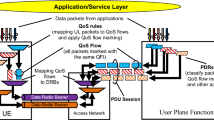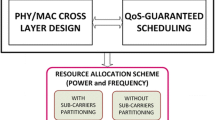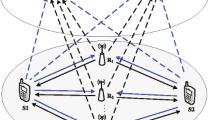Abstract
In this paper, we propose a complete radio resource management procedure for best-effort service in OFDMA systems, which improves the system fairness with graceful throughput degradation compared to the upper bound of the system throughput. By the proposed bandwidth and power allocation algorithms, the user in the worst channel environment has almost the same probability of accessing the system as the user in the best channel environment. Furthermore, a novel sub-channel allocation algorithm is proposed to exploit frequency selectivity and multi-user diversity gains simultaneously in OFDMA systems, which is able to achieve the highest system throughput given each user’s channel environment.
Similar content being viewed by others
References
Tao M. X., Liang Y. C., Zhang F. (2008) Resource allocation for delay differentiated traffic in multiuser OFDM systems. EEE Transactions on Wireless Communications 7(6): 2190–2201
Wu, Y., Le, Y. Q., & Zhang, D. M. (2008). An internal scheduling framework for management of best effort connections per SS in WiMAX system. In: Proceedings of the IEEE Globecom (pp. 1–6).
Ramezani, H. M., Lavafi, R., & Abolhassani, B. (2008). QoS aware dynamic resource allocation in multiuser OFDM systems with priority for different services. In: Proceedings of the IEEE IWCMC (pp. 141–146).
Wong C. Y., Cheng R. S., Letaief K. B., Murch R. D. (1999) Multicarrier OFDM with adaptive subcarrier, bit, and power allocation. IEEE Journal on Selected Areas in Communications 17(10): 1747–1757
Jang J., Lee K. B. (2003) Transmit power adaption for multiuser OFDM systems. IEEE Journal on Selected Areas in Communications 21(2): 171–178
Rhee, W., & Cioffi, J. M. (2000). Increasing in capacity of multiuser OFDM system using dynamic subchannel allocation. In: Proceedings of the IEEE VTC-spring (Vol. 2, pp. 1085–1089).
Shen, Z., Andrews, J. G., & Evans, B. L. (2003). Optimal power allocation in multiuser OFDM systems. In: Proceedings of the IEEE Globecom (Vol. 1, pp. 337–341).
Pan, D., & Yang, Y. Y. (2007) Max-Min fair bandwidth allocation algorithms for packet switches. In: Proceedings of the IEEE PDPS (pp. 1–10).
Liu J., Proutier A., Yi Y., Chiang M., Poor H. V. (2009) Stability, fairness, and performance: A flow-level study on nonconvex and time-varying rate regions. IEEE Transactions on Information Theory 55(8): 3437–3456
Li Y., Li Z., Chiang M., Calderbank A. R. (2009) Content-aware distortion-fair video streaming in congested networks. IEEE Transaction on Multimedia 11(6): 1182–1193
Zhou L., Wang X., Tu W., Muntean G., Geller B. (2010) Distributed scheduling scheme for video streaming over multi-channel multi-radio multi-hop wireless networks. IEEE Journal of Selected Areas in Communications 28(3): 409–419
Lan, T., Kao, D., Chiang, M., & Sabharwal, A. (2010). An axiomatic theory of fairness in network resource allocation. In: Proceedings of the IEEE INFOCOM (pp. 1–9).
Lozano A., Tulino, A. M., & Verdu, S. (2006). Mercury/waterfilling for fixed wireless OFDM systems. In: Proceedings of the IEEE Symposium on radio & wireless (pp. 211–214).
Lozano A., Tulino A. M., Verdu S. (2008) Optimum power allocation for multiuser OFDM with arbitary signal constellations. IEEE Transactions on Communications 56(5): 828–837
Munz, G., Pfletschinger, S., & Speidel, J. (2002). An efficient waterfilling algorithm for multiple access OFDM. In: Proceedings of the IEEE GLOBECOM (pp. 681–685).
Boyd S., Vanderberghe L. (2004) Convex optimization. Cambridge University Press, Cambridge, U.K
Lange K. (2004) Optimization. Springer, New York
Part 16 : Air interface for fixed and mobile broadband wireless access systems, IEEE P802.16e/D11 (2005).
Wang, Y. P., & Chang, K. H. (2008). Capacity analysis in M-WiMAX uplink considering the effect of adjacent channel interference from WCDMA downlink. In: Proceedings of the IEEE PIMRC, session O48.
Recommendation ITU-R M.1225: Guidelines for evaluation of radio transmission technologies for IMT-2000 (1997).
Author information
Authors and Affiliations
Corresponding author
Rights and permissions
About this article
Cite this article
Wang, Y.P., Chang, K.H. Novel Fairness Improved Radio Resource Management Schemes for Best-Effort Service in OFDMA Systems. Wireless Pers Commun 69, 1503–1515 (2013). https://doi.org/10.1007/s11277-012-0647-x
Published:
Issue Date:
DOI: https://doi.org/10.1007/s11277-012-0647-x




